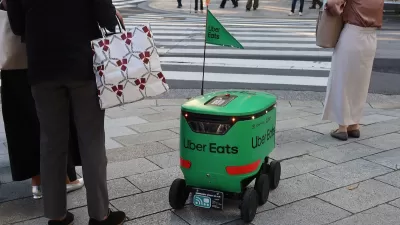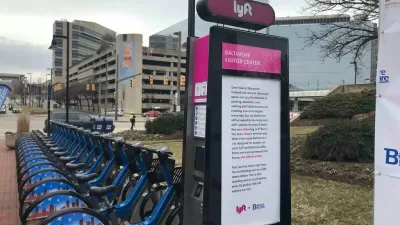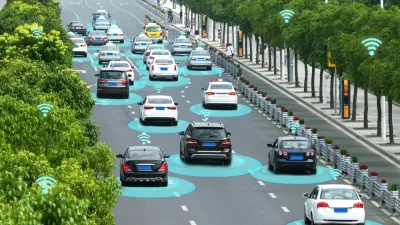Contrary to one some urbanists believe, some of the advancements of the new economy might better serve less dense, even suburban, environments. Example: a delivery robot created by the co-founders of Skype.
John Markoff provides a dispatch from the front lines of the automated economy in Menlo Park, California, where entrepreneurs he recently witnessed the debut of a robot capable of autonomous navigation, designed to solve the "last mile" problem familiar to planners: "getting goods like groceries, drugstore items and most small packages to suburban homes."
As self-driving cars and delivery services continue their quick ascent in the popular consciousness, products like this robot created by Starship Technologies with finding from Skype co-founders Ahti Heinla and Janus Friis, could join the two in futuristic synchronicity.
"Their task is simpler than the one facing designers of self-driving cars, because if something goes wrong, the Starship robot is much less likely to cause harm. While Amazon and Google are pursuing the idea of using airborne drones to deliver packages in urban areas, Mr. Heinla, who serves as the chief technology officer for Starship, believes his ground-based approach is more practical."
Markoff's explanation of the business model that rides on the success of this robot includes one critical distinction: "The system is not intended for crowded urban environments….Rather it is targeted for relatively affluent and uncrowded suburban neighborhoods, gated communities, assisted living facilities and campuses, where it will travel on sidewalks, programmed to mingle freely with pedestrians, bicyclists and cars."
FULL STORY: Skype Founders Build a Robot for Suburban Streets

Planetizen Federal Action Tracker
A weekly monitor of how Trump’s orders and actions are impacting planners and planning in America.

Canada vs. Kamala: Whose Liberal Housing Platform Comes Out on Top?
As Canada votes for a new Prime Minister, what can America learn from the leading liberal candidate of its neighbor to the north?

The Five Most-Changed American Cities
A ranking of population change, home values, and jobs highlights the nation’s most dynamic and most stagnant regions.

San Diego Adopts First Mobility Master Plan
The plan provides a comprehensive framework for making San Diego’s transportation network more multimodal, accessible, and sustainable.

Housing, Supportive Service Providers Brace for Federal Cuts
Organizations that provide housing assistance are tightening their purse strings and making plans for maintaining operations if federal funding dries up.

Op-Ed: Why an Effective Passenger Rail Network Needs Government Involvement
An outdated rail network that privileges freight won’t be fixed by privatizing Amtrak.
Urban Design for Planners 1: Software Tools
This six-course series explores essential urban design concepts using open source software and equips planners with the tools they need to participate fully in the urban design process.
Planning for Universal Design
Learn the tools for implementing Universal Design in planning regulations.
New York City School Construction Authority
Village of Glen Ellyn
Central Transportation Planning Staff/Boston Region MPO
Institute for Housing and Urban Development Studies (IHS)
City of Grandview
Harvard GSD Executive Education
Regional Transportation Commission of Southern Nevada
Toledo-Lucas County Plan Commissions





























